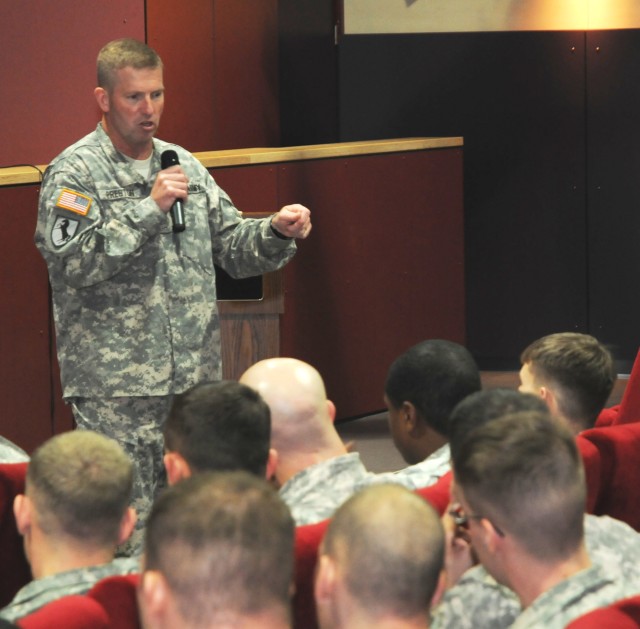HOHENFELS, Germany (Nov. 30, 2009) -- As the Year of the Noncommissioned Officer draws to a close, noncommissioned officers and enlisted Soldiers from 1st Battalion, 4th Infantry Regiment, got to see it out with a bang when they heard the Army's highest ranking NCO, Sgt. Maj. of the Army Kenneth Preston, speak at the U.S. Army Garrison Hohenfels Post Theater recently.
Preston spoke about where the Army has been, where it is today and where it is headed before addressing questions from Soldiers in the audience on a wide array of topics.
Preston began by acknowledging that there are about 263,000 Soldiers currently deployed, more than at the height of the Iraq surge in 2007, and he spoke of the stress that puts on the all-volunteer force.
He said to get the Army back in balance, Chief of Staff of the Army Gen. George W. Casey Jr. laid out four strategic imperatives to sustain, prepare, reset and transform the Army. He then touched briefly on all four while stressing the role NCOs play in the successful accomplishment of each.
Preston said to achieve the first goal of sustaining the all-volunteer force, the Army needs to have high recruitment and re-enlistment rates, the second of which is greatly influenced by NCOs.
One of the reasons Soldiers re-enlist is because of command climate, he said, which begins with junior NCOs, from corporals and sergeants all the way up.
"It's all about leadership ... command climate creates the atmosphere where Soldiers want to continue to serve; they want to continue to be a part of that organization; they want to continue to be part of that band of brothers and sisters. They don't want to leave it. It's family ... If you work for a crappy boss, you're not going to stick around, you're going to leave," said Preston, adding that the command climate also creates the essential atmosphere in which each Soldier feels he is a valued member of his team and is proud of their mission.
Preston then spoke about the role Soldiers and NCOs of the Joint Multinational Readiness Center play in the second key piece of Casey's strategy.
"We need to continue to prepare Soldiers for success in the current fight, and all of you here are part of that process ... You help train and you help prepare the Army for the missions that we have been given. And at the same time you are also part of that fight. That's something all of you can be very proud of," Preston said.
As he spoke about resetting and transforming the Army, Preston shared with the Soldiers topics he discussed with President Barack Obama during a meeting with the president and other military senior enlisted personnel in January 2009.
Preston said the top things he wanted to address with the president were stress on the force, recruitment, retention and the Year of the NCO.
He said Obama asked why the Army was using a 15-month deployment model when other services were using shorter deployments. Preston said because of the demand for troops in theater versus the number of troops available, Army leaders were faced with the difficult decision of either 12-month deployments with eight to nine months at home, or 15-month deployments with 12 months at home, and ultimately chose the latter.
Now that units are off of 15-month deployment schedules, Preston said Army senior leaders are moving forward on formally establishing a reset model for the human element of the Army machine with the goal of six months dwell time before beginning preparations for the next deployment.
Preston said he also shared with the president the hardships frequent and prolonged deployments place on Soldiers, their spouses and their children. He told him about how frequently changing schools can leave children behind a grade at their next location and how changing duty stations can force servicemembers to sell their homes at a loss. They spoke about suicide and divorce rates and Army initiatives to prevent them.
When Preston spoke to 1-4 Infantry Soldiers about moving forward and the positive recruiting and retention numbers he shared with the president, he said they should each be proud to be "the best our society has to offer."
"Literally, the recruiters are out there looking for those needles in the haystack ... those that are qualified, with the potential, to come into the military. And all of you are the best America has to offer and you should be very proud of that."


Social Sharing